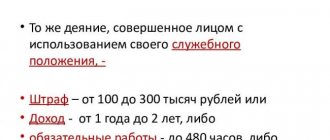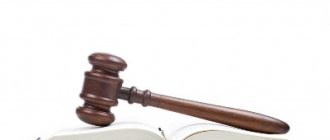The Constitution of the Russian Federation and family legislation contain provisions aimed at protecting the institution of family, marriage, as well as minor children and their parents.
Parents are given rights and bear certain responsibilities from the moment their child is born. All parental rights and responsibilities are strictly defined by law, therefore, if rights are violated, parents have the right to demand their protection.
From our article you will learn what rights parents have and what is the procedure for exercising such rights.
What administrative penalties can be applied to parents?
Commissions for minors may apply administrative measures to parents (issue a warning, impose an obligation to make amends for the harm caused, or impose a fine):
- in case of failure of parents to fulfill their responsibilities for raising and educating children;
- for involving them in drinking alcohol or using drugs;
- for appearing in public places while intoxicated or drinking beer or alcohol in public places by teenagers under 16 years of age.
When to complain
The basis for a complaint may be any form of unwanted behavior of the father and mother or violation of the rights of children:
- Leaving a minor unattended in conditions dangerous to life and health.
- Inadequate living conditions: unsanitary condition of housing (dirt, dampness, chaos, cold), lack of food, treatment, normal clothing according to age and season.
- The use of physical (beating, punishment), mental (verbal threats, humiliation, insults), sexual violence, and other signs of child abuse.
- Using parental rights to the detriment of children's interests: limiting communication with peers, creating obstacles to visiting educational institutions, clubs and leisure activities, inducing them to begging and bad habits.
- Alcohol or drug addiction.
- Presence of mental illness. Diagnosis of such health problems may become the basis for recognizing the incompetence of the father/mother and transferring the child to the second parent, and in his absence, to the guardianship authorities.
- Child abandonment.
- Violation of the rights of a minor during transactions with property or funds belonging to him.
When planning to write a complaint, it is important to make sure that the grounds are fair and reliable and to be aware of the consequences of your actions: at a minimum in the form of conversations and inspections of the family by authorized bodies, at a maximum - deprivation of parental rights.
In what cases are parents held criminally responsible?
The Criminal Code of the Russian Federation provides for special rules on the criminal liability of parents:
- for involving minor children in committing a crime through promises, deception, threats or in any other way;
- for involving a minor in the systematic use of alcoholic beverages and intoxicating substances;
- for involvement in prostitution, vagrancy or begging;
- for failure to fulfill or improper fulfillment of responsibilities for raising children, if these acts are associated with cruel treatment;
- for malicious evasion of payment of child support.
Comments to the Family Code of the Russian Federation
The Family Code of the Russian Federation, which entered into force, has made significant changes to the regulation of the rights and responsibilities of parents. First of all, this concerned taking into account the opinions and interests of children. Now let's look at what rights and responsibilities parents have.
Raising children is both the right and responsibility of parents. “Parents are responsible for the upbringing and development of their children. They are obliged to take care of their health, physical, mental, spiritual and moral development of their children” (Article 63 of the RF IC). The right to education is to provide parents with the opportunity to personally raise their children, to independently choose methods and means of raising a child. Responsibilities for education include caring for the health, physical, mental and moral development of the child. In our difficult times, the formation of a child as an individual, his mental, spiritual and moral development are of great importance not only for the family, but also for society as a whole. The desire of parents to raise a spiritually rich personality, to give the child basic ideas about good and evil, decency and meanness, to develop in him a desire for knowledge, and the ability to communicate with people is the key to the normal development of civil society. The Family Code clearly outlines the permissible limits for the exercise of parental rights: “Ensuring the interests of children should be the main concern of their parents” (Article 65 of the RF IC). In this regard, the legislator determined that “...parental rights cannot be exercised in conflict with the interests of children "(Article 65 of the RF IC).
In addition to the basic principle of exercising parental rights, the Family Code of the Russian Federation contains specific instructions on what parents do not have the right to do: “When exercising parental rights, parents do not have the right to cause harm to the physical and mental health of children, or their moral development. Methods of raising children must exclude neglectful, cruel, rude, degrading treatment, insult or exploitation of children” (Article 65 of the RF IC). The responsibility of parents for the upbringing and development of their children is provided not only in the Family Code of the Russian Federation, but also in the UN Convention on the Rights of the Child. Both parents bear responsibility for the upbringing and development of their children, regardless of whether the parents are in a registered marriage, as well as wherever they are. It should be noted here that both parents “...have equal rights and bear equal responsibilities in relation to their children” (Article 61 of the RF IC). However, in practice, due to established traditions, in the event of divorce, minor children are transferred to the care of their mother. Only in exceptional cases, when the mother abuses alcohol, uses drugs, or leads an antisocial lifestyle, does the court hand over the children to be raised by the father. Currently, the number of fathers who would like the child (children) to live with him after divorce is steadily growing, but judicial practice on this issue is changing very slowly. It is especially difficult to hand over young children to be raised by a father, since it is traditionally believed that a small child cannot do without a mother, and the father will not be able to care for the child properly. From the age of 10, a child’s opinion is taken into account. And the court is obliged to take this opinion into account.
But if parents or one of them exercises their parental rights to the detriment of the rights and interests of children, then they bear responsibility in the manner prescribed by law (Article 65 of the RF IC). This may be administrative liability for: • malicious failure by parents to fulfill their duties in raising and educating minor children; • use of narcotic or toxic substances by minors; • teenagers under 16 years of age drinking alcohol in public places; • appearing drunk in public places; • bringing a minor to a state of intoxication directly by the parents.
Parents also bear administrative responsibility if the teenager has committed petty hooliganism (Article 162–64 of the Code of Administrative Offenses of the Russian Federation). In all of these listed cases, a fine is imposed on the parents. A more serious responsibility of parents is provided for by the Family Code of the Russian Federation - deprivation or restriction of parental rights (Articles 69, 70, 71, 73 of the RF IC).
Parents who do not fulfill or improperly fulfill their responsibilities for raising children and combine this with cruel treatment of them are subject to criminal liability (Article 156 of the Criminal Code of the Russian Federation “Failure to fulfill responsibilities for raising a minor”). Cruel treatment must be understood not only as beatings, bullying or systematic humiliation of a minor, but also the inaction of parents, expressed in leaving the child without food, locking him alone in a room for a long time, etc. If the court finds that the cruelty of the parents led to harm to health minor, the parent may be prosecuted and convicted under the above article and other articles of the Criminal Code of the Russian Federation.
Deprivation of parental rights is a very serious measure that is used in cases where it is necessary to protect a child from his own parents. This measure is applied only when all other measures of influence on the parents have been exhausted, but the parents have not realized their guilt towards the child.
“Parents (or one of them) may be deprived of parental rights if they: 1. evade fulfilling their duties, including malicious evasion of child support; 2. refuse, without good reason, to take their child from the maternity hospital (ward) or from another medical institution, or other similar social institutions; 3. abuse their parental rights; 4. ill-treat children, including physical or mental violence against them, attacks on their sexual integrity; 5. are patients with chronic alcoholism or drug addiction; 6. committed an intentional crime against the life or health of their children or against the life or health of their spouse” (Article 69 of the RF IC).
The procedure and conditions for deprivation of parental rights are as follows (Article 70 of the RF IC): 1. “Deprivation of parental rights is carried out in court. Cases of deprivation of parental rights are considered upon the application of one of the parents (persons replacing them), the prosecutor, as well as upon applications from bodies or institutions charged with protecting the rights of minor children (guardianship and trusteeship authorities, commissions for minors, institutions for orphans and children left without parental care, and others).” It should be noted that grandparents and other relatives do not have the right to apply to the guardianship and trusteeship authority, the prosecutor's office, or the commission for minors with a request that these authorities file a claim in court on their own behalf. 2. A claim for deprivation of parental rights is brought at the place of residence of the defendant, that is, the parent who is asked to deprive of parental rights. The plaintiff in court is the body that protects the interests of the child. 3. A parent deprived of parental rights in relation to a child, in the future, as the legal representative of a minor, cannot receive child benefits, and also cannot count on receiving support from the minor child if he is disabled. Naturally, a parent deprived of parental rights is deprived of all benefits provided by the state for parents with children: the right to additional leave, to establish various forms of preferential labor regime (employment on weekends), etc. 4. “If the court when considering a case of deprivation of parental rights, he discovers signs of a criminal offense in the actions of the parents (one of them), he is obliged to notify the prosecutor about this.” 5. “The court is obliged, within three days from the date of entry into legal force of the court decision on deprivation of parental rights, to send an extract from this court decision to the civil registry office at the place of state registration of the child’s birth.” But persons deprived of parental rights retain the obligation to support their children. In addition, such parents, for three years after deprivation of their parental rights, are liable for harm caused by their children in accordance with paragraph 2 of Art. 71 RF IC, art. 1075 of the Civil Code of the Russian Federation, if the court decides that the harm caused by the child was a consequence of the parents’ improper performance of their duties.
Raising children is work and duty. Parents have the right and obligation to raise their children, to provide the means possible to care for the child, to promote his spiritual, moral and physical development in accordance with generally accepted standards and the characteristics of the child’s personality. Parents are free to choose ways and methods of education that are consistent with the developing abilities of the child. However, they do not have the right to exercise their right to education in conflict with the interests of the children. At the same time, parents bear the main responsibility (moral and legal) for the upbringing and development of their children. For a positive educational impact on the child, parents have RIGHTS that are guaranteed and enshrined in international, federal and regional legislative documents: the Declaration of the Rights of the Child, the Convention on the Rights of the Child, the Constitution of the Russian Federation, the Family Code, the Civil Code, the Criminal Code, the Law of the Russian Federation “On Education” , Resolutions of the Government of the Russian Federation and so on.
Based on these documents, we can talk about the decisive role of the parent in education, because it is mainly through the family that children inherit the moral coordinates and orientation of the individual. And this is its meaning, because “a good family will add intelligence,” and “a parent’s word is not spoken,” says popular wisdom. An article of the Family Code of the Russian Federation states: “parents have the right and obligation to raise their children, to provide the means possible to care for the child, to promote his spiritual, moral and physical development in accordance with generally accepted standards and personality characteristics.” Article of the Convention on the Rights of the Child (adopted by the UN in 1989) states: “Parents have the responsibility to protect the child from all forms of physical or psychological violence, insult or abuse, neglect, abuse, exploitation and to prevent these violations of rights themselves, including neglect child." But responsibility is not only moral, but also legal; it is more strict and occurs for violation and failure to comply with the law. Thus, the article of the Code of the Russian Federation on Administrative Offenses provides for administrative measures that can be applied to parents: • for malicious failure to fulfill the duties of raising and educating minors • for the consumption of narcotic substances by children without a doctor’s prescription • for committing offenses by minors • for petty hooliganism, hooliganism committed by teenagers aged 14 to 16 years, the Article of the Criminal Code of the Russian Federation provides for criminal punishment for failure to fulfill or improper fulfillment of the duties of raising minors by parents. It must be said that the rights, duties and responsibilities for the upbringing and education of children are based on morality, on the desire for goodness, truth, justice, and humanity. Therefore, it is necessary to raise children using methods that do not humiliate the human dignity of children, because “upbringing is a great matter; it decides the fate of a person,” the great Russian writer V. G. Belinsky quite rightly noted. The famous psychologist Alan Fromm wrote: “the main influence on a child’s development will always be exerted not by the school, but by the parents.” One of the main reasons for juvenile criminal activity is a dysfunctional family environment. Families in a socially dangerous situation (dysfunctional) include those families where parents or other legal representatives of minors do not fulfill their responsibilities for their upbringing, education or maintenance, negatively influence their behavior or abuse them. According to Art. 63 of the Family Code, parents have the right and obligation to raise their children; they are responsible for the upbringing and development of minors. They are obliged to take care of the health, physical, spiritual and moral development of children. The law, on the one hand, gives the right to education, protects this right, and on the other hand, punishes persons who have forgotten about their duty. Punishment of persons who evade raising children is provided for by the Code of Administrative Offences, Criminal and Family Codes. Malicious failure by parents or persons replacing them to fulfill the duties of raising and educating minor children, as well as the commission of offenses by children, entails the imposition of a fine on parents or persons replacing them. For 8 months of 2012, under Article 5.35 Part 1 of the Code of Administrative Offenses of the Russian Federation (failure of parents or other legal representatives of minors to fulfill obligations for the maintenance and upbringing of minors), 79 materials were reviewed. Parents are given a warning or an administrative fine. The Criminal Code of the Russian Federation allocates a separate chapter to crimes against family and minors, which stipulates the responsibility of parents for criminal acts against children. Thus, for involving minors in committing a crime, the guilty parent or the person charged by law with the responsibility for raising a minor is punished by imprisonment. For the involvement of minors in antisocial acts (systematic consumption of alcoholic beverages, intoxicants, prostitution, vagrancy or begging), parents are also held liable in the form of imprisonment. For failure to fulfill or improper fulfillment of responsibilities for raising children, associated with cruel treatment of minors, parents are punished with imprisonment. Cases of cruelty between parents and children are extremely rare, but almost every year several people are brought to justice for this type of criminal act. In the territory of the Volkhov municipal district for 8 months of 2012, no materials on cruel treatment of children were considered. The most severe and severe punishment for parents who evade raising children is restriction of parental rights. In exceptional cases, when all preventive measures on the family have been exhausted, the law provides for deprivation of parental rights. Why can parents be deprived of parental rights? For evasion of parental responsibilities, including malicious evasion of child support; if parents, without good reason, refuse to take their child from a maternity hospital or other medical or educational institution, abuse their parental rights; in cases of cruelty to children, including physical or mental violence against them, attacks on their sexual integrity; if the parents are sick with chronic alcoholism or drug addiction, and also commit a deliberate crime against the life or health of their children or against the life and health of their spouse. The state of moral, physical, mental health of children depends on the reasonable, kind attitude of parents. Children have the right and should be raised in an atmosphere of love, happiness and mutual understanding.
RIGHTS, DUTIES AND RESPONSIBILITIES OF PARENTS Parents have the right to raise a child, and also bear duties and responsibilities for the upbringing and development of the child. According to the Family Code of the Russian Federation, this is called parental rights. Parental rights terminate when children reach the age of 18 (the age of majority), as well as when minor children marry, and in other cases established by law when children acquire full legal capacity before reaching adulthood. Parents have the right: - to protect the rights and legitimate interests of children, to speak before individuals, including in courts, their legal representatives without obtaining special powers; - to ensure that the state makes it generally accessible and free for their children to receive basic general education; - to choose for their children (before they receive basic general education) forms of education and types of educational institutions, including family education or in non-state educational institutions; — to reimburse at the expense of the state the costs of educating children in non-state educational institutions that have state accreditation and implement general education programs; — for the admission of children for education in educational institutions located at the place of residence; — to familiarize yourself with the Charter of the educational institution and other documents regulating the organization of the educational process; - to participate in the management of the educational institution in which their children study; - to become familiar with the progress and content of the educational process, as well as assessments of the progress of their children; - to transfer a child receiving education in a family to continue education in a general education institution with positive certification; — express consent (or disagreement) for children to undergo military training in civilian educational institutions on an optional basis; - ensure the religious and moral education of children in accordance with their own beliefs; - for assistance from the state in fulfilling their responsibilities for the education and upbringing of children; - to care and support from their adult children, if the parents have not been deprived of parental rights; — parents living separately from the child have the right to communicate, participate in upbringing, resolve educational issues, and receive information about their child from educational, educational and other institutions (restrictions are possible only if there is a threat to the life or health of the child). When talking about rights, we should not forget about responsibilities. Responsibilities are inseparable from rights. Parents are obliged to: - ensure and protect the rights and interests of their children, not cause harm to the physical and mental health of children, their moral development; raise children, excluding neglectful, cruel, rude, degrading treatment, insult or exploitation; — ensure that children under 15 years of age receive basic general education in a comprehensive school or in another educational institution equivalent in status; — comply with the Charter of the educational institution; - to prevent improper interference in the work of teachers on issues that, by their nature, fall within the scope of the teacher’s professional responsibilities; - to provide, within the limits of their abilities, the living conditions necessary for the normal development of the child; - support their minor children (the procedure and forms for providing maintenance to children are determined by the parents independently; if parents do not provide maintenance to their minor children, funds for the maintenance of children (alimony) are collected from the parents (parent) in court). For failure to fulfill or improper fulfillment of parental responsibilities, as well as for committing offenses against their children, parents bear administrative, criminal and other liability.
What administrative penalties can be applied to parents? Commissions for minors may apply administrative measures to parents (announce a public reprimand or warning, impose an obligation to make amends for the harm caused or impose a fine): - in case of malicious failure by parents to fulfill their duties in raising and educating children; - for bringing them to a state of intoxication or consumption of drugs without a doctor’s prescription; — for violations of traffic rules by teenagers under 16 years of age; - for the appearance of children in public places while drunk, as well as for their drinking of alcoholic beverages or in connection with the commission of other offenses.
In what cases are parents held criminally responsible? — The Criminal Code of the Russian Federation provides for special rules on the criminal liability of parents: — for involving minor children in committing a crime through promises, deception, threats or in any other way; - for involving a minor in the systematic use of alcoholic beverages and intoxicating substances; - for involvement in prostitution, vagrancy or begging; - for failure to fulfill or improper fulfillment of responsibilities for raising children, if these acts are associated with cruel treatment; - for malicious evasion of payment of funds for child support.
Who and under what circumstances can deprive parents of parental rights or limit their rights? Parents may be deprived of parental rights by court if they:
- - evading the duties of parents, including maliciously evading payment of alimony;
- - abuse parental rights;
- - abuse of children, including mental and physical violence, attacks on sexual integrity;
- - committed a crime against the life or health of the spouse.
If there is an immediate threat to the child's life or health, the guardianship and trusteeship authorities may immediately take the child away from the parents based on a decision of the local government. Taking into account the interests of the child, the court can take the child away from the parents without depriving parental rights (limitation of parental rights). Such a decision is possible due to circumstances beyond the parents’ control (dangerous diseases, difficult family circumstances, etc.), and in cases where leaving a child with his parents is dangerous for him.
What does termination of parental rights entail? Parents deprived of parental rights or limited in rights lose rights based on the fact of relationship with the child, as well as the right to benefits and state benefits established for citizens with children. Deprivation of parental rights does not relieve parents from the responsibility to support the child.
Is it possible to restore parental rights? If a parent has changed his behavior, lifestyle or attitude towards raising a child, he can be restored to parental rights.
Who is responsible for harm caused by a child under 14 years of age?
Parents, unless they prove that the harm was not their fault. If at the time of the harm the minor was under the supervision of a school, hospital, health camp, etc., the institution will be responsible for the harm unless it proves that the harm was not its fault. But if the parents do not have sufficient funds to compensate for the harm, and the offender himself, having become legally capable, has such funds, the court has the right to demand compensation for the harm from the one who caused it.
Parents also bear property liability for transactions involving young children (under 14 years of age).
The basis for the emergence of the rights and responsibilities of parents
A child is a person who has not reached the age of majority, that is, 18 years old. Parents exercise their rights and responsibilities in relation to their children until the latter reach adulthood.
Please note : Russian legislation establishes cases in which a child can become an adult and gain full legal capacity before the age of 18. Such cases include the marriage of a minor, as well as the implementation of labor or entrepreneurial activities.
The basis for the emergence of the rights and responsibilities of parents is their legally established blood relationship, that is, the origin of the child from a specific mother and father.
The origin of the child from the mother is established on the basis of a medical birth certificate confirming the birth of the child in a medical organization.
If the child’s parents are in a registered marriage, then the child’s mother’s husband is automatically recognized as the child’s father.
It is important to know: if within three hundred days after the divorce the ex-wife gave birth to a child, then the ex-husband of the child’s mother is automatically recognized as the father of the child.
In a situation where a child was born to unmarried persons, paternity is established by submitting a joint application from the mother and father of the child to the civil registry office.
In the event of the death of the child's mother or the impossibility of establishing her current whereabouts, paternity is established upon the application of the father with the consent of the guardianship and trusteeship authority. If there is no such consent, then paternity is established in court.
Civil registry office employees make a record of the child’s parents in the birth certificate, which confirms the relationship between the parents and the child.






